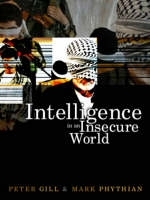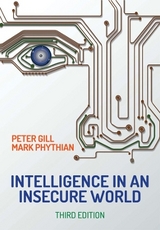
Intelligence in an Insecure World
Polity Press (Verlag)
978-0-7456-3245-2 (ISBN)
- Titel erscheint in neuer Auflage
- Artikel merken
It concludes by discussing the need for democratic control of intelligence to prevent its future abuse by unaccountable state or corporate agencies.
Peter Gill is Professor of Politics and Security at Liverpool John Moores University. Mark Pythian is Professor of International Security at the University of Wolverhampton.
List of Figures, Tables and Boxes. Preface. Abbreviations. 1 What is Intelligence? Defining Intelligence. Evolution. Limitations. Significance. Conclusion: Towards a Theory of Intelligence. 2 How Do We Understand Intelligence? Introduction. The Critique of Positivism. The Challenge of Postmodernism. Critical Realism: Neither Positivist nor Postmodernist. Agency and Structure. Surveillance: Knowledge and Power. Conclusion: a Map for Theorising and Researching Intelligence. 3 Who Does Intelligence? Introduction: Security Networks. Mapping Intelligence Networks. State sector. Corporate sector. Communitarian sector. Cross-sectoral networks. Making Security Networks Work. Conclusion. 4 How Do They Gather Information? Introduction. Planning and Direction. Open Sources. Secret Sources. HUMINT: human intelligence. SIGINT: signals intelligence. IMINT: imagery intelligence. HUMINT Vs. SIGINT: The Post-9/11 Debate. Gathering and Hunting: an erosion of boundaries? The Predator: a vision of the future? Extraordinary rendition. Conclusion. 5 What Do They Do With the Information Gathered? Introduction. Analysis. 'No good will come of this': Problems with Dissemination. Where intelligence Turns into Action: the Intensification of Surveillance. Conclusion. 6 Why Does Intelligence Fail? Introduction. The Limits of Intelligence. Failure Located in Collection and Analysis. The Policy Maker-Intelligence Interface as a Site of Intelligence Failure. Politicisation of Intelligence. The 9/11 Commission Report: Explaining Intelligence Failure? The 7 July 2005 London Bombings: An Intelligence Failure? Conclusion. 7 Iraqi WMD: What Kind of Intelligence Failure? Introduction. US Senate Select Committee on Intelligence. The Butler Inquiry. Political pressure on the JIC. Australian Inquiries. Conclusion. 8 Can Intelligence be Democratic? Introduction. Defining Control, Review and Oversight. The Legal and Ethical Bases of Oversight. Organising External Oversight. Parliamentary Oversight: the Case of the UK. Extra-Parliamentary Oversight. Media, NGOs and citizens. Conclusion. 9 Intelligence for a More Secure World? Notes. Bibliography. Index.
| Erscheint lt. Verlag | 3.7.2006 |
|---|---|
| Zusatzinfo | 1, black & white illustrations |
| Verlagsort | Oxford |
| Sprache | englisch |
| Maße | 170 x 244 mm |
| Gewicht | 399 g |
| Themenwelt | Sozialwissenschaften ► Politik / Verwaltung ► Staat / Verwaltung |
| ISBN-10 | 0-7456-3245-9 / 0745632459 |
| ISBN-13 | 978-0-7456-3245-2 / 9780745632452 |
| Zustand | Neuware |
| Haben Sie eine Frage zum Produkt? |
aus dem Bereich



